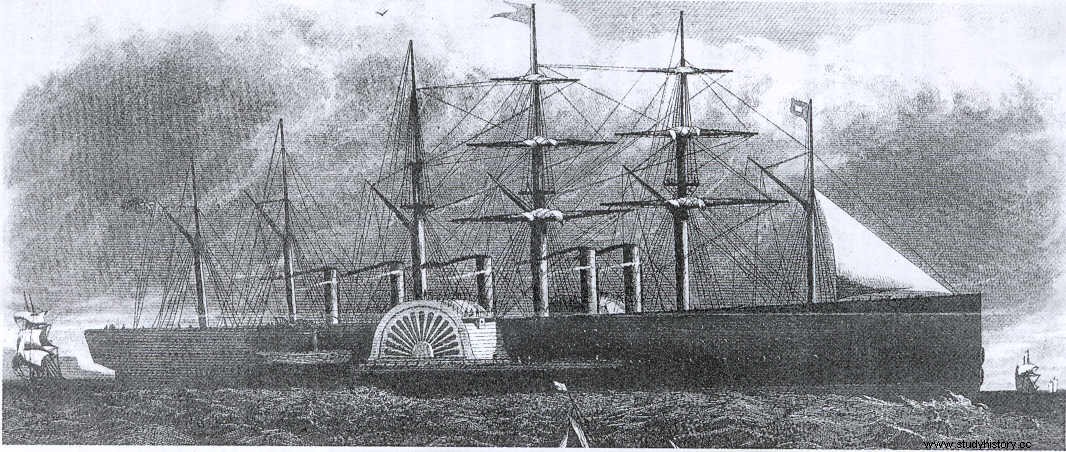The nineteenth century was shaken, in its quiet ways, with the arrival of the Industrial Revolution, a kind of movement that had arisen to initiate a process of change and improvement in the lives of the people of the time. Those years quickly abandoned their distant customs, receiving, with enthusiasm and admiration, the appearance of a new intellectual flow that altered all the orders established up to that moment. That society that lived dedicated to cultivation, manual production and long and endless journeys by land and sea, found that the showy machines, which had been building for some time in the ideology of seasoned characters, presented themselves to everyone ready to start a new was.

One of the great advances of that period was the development of the steam engine. Thanks to the impulse that the strength of these devices offered, the world of those years achieved an improvement in communications that transformed the societies of the different continents. Countries began to look beyond their borders, directing their attention to the hidden worlds of the colorful and picturesque eastern zone. China or Japan appeared to the calm citizen as the destination that was necessary to explore, if one wanted to reach new realities that would allow one to rise above the known. A consequence of this movement was the appearance of faster and more powerful steam engines, which began the construction of fast and reliable means of transport. The new ships, trains, and land vehicles, which began to travel enormous distances in increasingly shorter times, were driven by advances in the study of electricity, and the result was a continuous movement between characters from one place to another. .

Indeed, the new possibilities offered by the various gadgets that emerged every day, such as the telegraph or electric lighting, began a new commercial activity where the hidden, the mysterious, the unknown of distant countries, remained at close range distances. Quickly, the world turned its attention to the striking oriental scenarios, where a variety of varied and colorful products were presented as objects to be obtained, and for which efforts had to be made to reach agreements that would allow the new discoveries to be transferred to distant purchasing countries. Silk, porcelain, spices, expensive fabrics or ornamental products for homes, became articles of common circulation, which everyone wanted to acquire, and which represented high incomes for the merchants devoted to their transport. But a new, striking, pleasant and exotic product was presented above all:tea .

This drink, well known in the eastern zone, consumed by its people, appreciated by foreigners, coveted by those furthest from those lands, and became, over time, current and habitual, began a prosperous trade between Europe and China, from where it was obtained in its highest quality. At the same time, it meant the creation of a problem between England and that country, due to the greed and personal ambitions of European merchants, eager to obtain the product without giving what was fair in return. They offered, for the desired drink, objects of little value, which they thought would please the oriental exporters, but which were not well received by them. Wooden watches, worthless coins or unimportant adornments, tried to give themselves in exchange for the concoction, which endangered their trade. However, as is known, the tea ended up on its way to Great Britain, where its use became popular thanks to the Duchess of Bedford . This is how David Wern narrates it in his novel The Three Unusual Creations of Klant Woss :
The following centuries saw the arrival of new uses for the long-awaited potion. From an exclusive drink, it became popular; from an unaffordable item, it became everyone's drink, that drink that accompanied each meal, and, especially, the snack that was served in the "Afternoon Tea". It was Anne, Duchess of Bedford, who spread the use of tea at this characteristic time of day. Transforming the custom of eating it at other times, the Duchess got used to accompanying herself with a piece of food, or "muffin", and the striking broth, organizing meetings with her friends, where everyone participated in the snack. From then on, the custom spread to the rest of the classes, and soon, all of English society promptly requested their evening cup of tea, and their little aperitif.
As can be seen, tea went from being an agitating element to a comforting element for some people who began to live in a changing society, where progress became commonplace, and which opened a path that continues to be followed today. The drink became a benchmark for a transformed society, looking forward, and that would never again know the quiet ways with which it began.
Here you have the reference of the novel The three unusual creations of Klant Woss , a setting of the time from a very original point of view:adventures and… science fiction:
see The three unusual creations of Klant Woss in myLIBRETO
